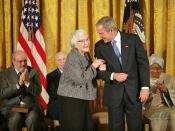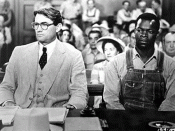To Kill A Mockingbird When people assume they do not acquire the correct information. When one assumes, they are making a judgement on something without all the knowledge of the item that they are making an assumption about. This often can be classified as a prejudice, but it can be many different types of prejudice. This type of "assuming prejudice"ÃÂ has been around for many years and sayings were developed about it. For example, things do not always appear to be what they really are, never ass/u/me because you will make an ass out of u (you) and me. In the book, To Kill A Mockingbird by Harper Lee, there were many types of prejudice, but there was specifically assuming prejudice. The book is seen through the innocent eyes of a very young child, Jean Louise Finch, also known as Scout. Through Scouts eyes one can see the assuming prejudice in the book about Arthur Radley, also known as "Boo,"ÃÂ Dolphus Raymond, and Atticus Finch.
These people have been the victims of assuming prejudice in the book To Kill A Mockingbird.
Boo Radley was kept inside his house, because he was founded guilty with a group of his friends for virtually nothing. His father did not want him to go to prison so he told the judge that he would keep Authur inside the house from now on. From then on, no one had really seen him, except for his family. Since he was "locked"ÃÂ inside, people started to make assumptions about him. Jeremy Finch, Scout's older brother also known as Jem, gave a description to Scout and Dill, their friend that comes during the summer to visit, about Boo Radley. Jem said, "Boo was about six-and-a-half feet tall, judging from his tracks; he dined on raw squirrels and any cats he could catch, that's why his hands were bloodstained"ÃÂif you ate an animal raw, you could never wash the blood off. There was a long scar that ran across his face; what teeth he had were yellow and rotten; his eyes popped, and he drooled most of the time."ÃÂ Jem, Scout, and Dill made this assumption until they encountered Boo. When Mrs. Maudie's house was burning down, Jem and Scout were watching it from a distance and they were not aware of their surroundings. When they were outside, Boo had slipped a blanket over them to keep them warm. This displayed that he was not gruesome like they had made him out to be. Later in the story, although the author did not say it, one may conclude that Boo saved Jem's life and inadvertently Scout's life as well. When Boo brings Jem back to Jem's house, Scout sees Boo for the first time and he turns out to be a very humble and quiet man. In this situation of assumption prejudice, the solution was actually meeting Boo to see who he really was.
Dolphus Raymond was a white man, who was considerably rich, but he married a black woman and this was forbidden in the type of society that he was living in. To counter his situation, he acted like a drunk all day and everywhere he went. However, he was really not "the town drunk,"ÃÂ because he was never drinking alcohol. In fact, he was drinking Coke a' Cola. Mostly everyone in the town suspected him to be drunk and excused what he did because he was a drunk. The whole entire town of Maycomb assumed that he was a drunken man. Scout and Dill find out that he is not a drunk, but a very wise man when they encounter him outside the courthouse. Dill was feeling sick during the trial of Tom Robinson, so Scout took Dill outside to get some air and Mr. Raymond gave them very wise advise. Mr. Raymond said, "Cry about the simple hell people give other people"ÃÂwithout even thinking. Cry about the hell white people give to colored folks, without even stopping to think that they're people, too."ÃÂ Since everyone assumed that he was "the town drunk,"ÃÂ no one but Scout, Dill, and possibly a few exceptions would know of his brilliance. Mr. Raymond was the victim of two prejudices, social prejudice, caused by assuming, and racism, because he married a black woman. His social prejudice can be solved by people seeing him for who he really is and by letting others know what the truth really is. However, Mr. Raymond creates this prejudice himself by acting like a drunk to justify to the community why he married a black woman. Therefore, the previous solutions will not work until Mr. Raymond accepts who he is.
Most people will probably think that assuming prejudice happens in a community from one to another because they do not see each other often at all, or do not know who one another is. However this may not be the case in all situations, because assuming prejudice can happen in a home as well. In the book, To Kill A Mockingbird, Scout and Jem have assuming prejudice toward their father, Atticus. They both believe that their father did nothing and never accomplished anything, except in being a lawyer. Basically they believe that their father was a nobody when he was young and never did anything. However, Atticus was the best shot in the county and he could hit or kill anything in one shot. Jem and Scout learned that their father was the best shot in the county and earned himself the nickname "one shot,"ÃÂ when a "mad-dog"ÃÂ was coming into Maycomb. Jem and Scout learned about their father when Sheriff Heck Tate and their father showed up in a car to kill the "mad-dog."ÃÂ The Sheriff said that he was never good at shooting and asked Atticus to do it. Atticus took the rifle and aimed at the dog and killed it in one shot and lived up to his nickname. This is when the children learned their father was the best shot in the county and that he was not after all a "nothing."ÃÂ The solution to this prejudice was Jem and Scout actually seeing their dad shoot the dog and then by hearing other stories about their dad afterwards.
When people assume they do not acquire the correct information. Many people everyday display this prejudice knowingly or unknowingly. The best solution for this type of prejudice is finding the truth. No matter if one witnesses it, or hears it from others, as long as it is the exact truth about something. Jem and Scout, but mainly Scout, found out that Boo was not what they had made him up to be when they saw him and talked to him. The community never did find out that Dolphus Raymond is not a drunk, but Scout and Dill did when they left the courtroom. For the assumption prejudice to stop, Mr. Raymond must first except himself, because he is deliberately causing himself to be the victim of assumption prejudice. Also, Jem and Scout found out by witnessing that their father was not a "nothing"ÃÂ when he killed the "mad-dog."ÃÂ Their assumption prejudice was solved when they saw their dad shoot the dog and thus learned the real truth about their father. The solution to assumption prejudice is to learn and accept the real the truth before making judgement on something.



